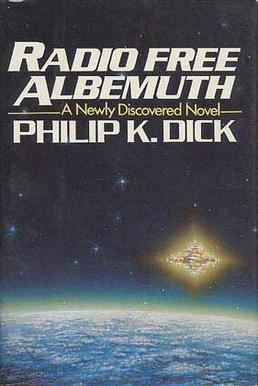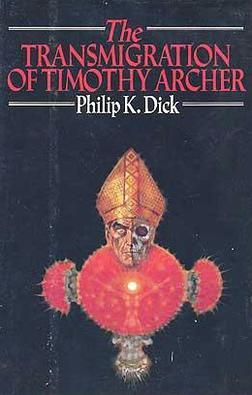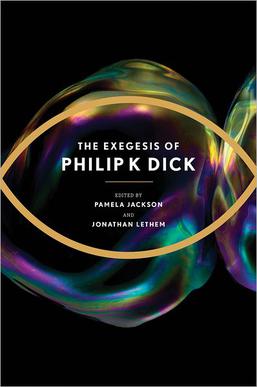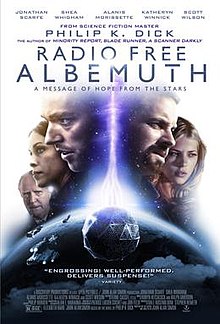
Philip Kindred Dick, often referred to by his initials PKD, was an American science fiction writer and novelist. He wrote 44 novels and about 121 short stories, most of which appeared in science fiction magazines during his lifetime. His fiction explored varied philosophical and social questions such as the nature of reality, perception, human nature, and identity, and commonly featured characters struggling against elements such as alternate realities, illusory environments, monopolistic corporations, drug abuse, authoritarian governments, and altered states of consciousness. He is considered one of the most important figures in 20th-century science fiction.

A Scanner Darkly is a science fiction novel by American writer Philip K. Dick, published in 1977. The semi-autobiographical story is set in a dystopian Orange County, California, in the then-future of June 1994, and includes an extensive portrayal of drug culture and drug use. The novel is one of Dick's best-known works and served as the basis for a 2006 film of the same name, directed by Richard Linklater.

Do Androids Dream of Electric Sheep? is a 1968 dystopian science fiction novel by American writer Philip K. Dick. It is set in a post-apocalyptic San Francisco, where Earth's life has been greatly damaged by a nuclear global war, leaving most animal species endangered or extinct. The main plot follows Rick Deckard, a bounty hunter who has to "retire" six escaped Nexus-6 model androids, while a secondary plot follows John Isidore, a man of sub-par IQ who aids the fugitive androids.

Radio Free Albemuth is a dystopian novel by Philip K. Dick, written in 1976 and published posthumously in 1985. Originally titled VALISystem A, it was his first attempt to deal in fiction with his experiences of early 1974. When his publishers at Bantam requested extensive rewrites he canned the project and reworked it into the VALIS trilogy. Arbor House acquired the rights to Radio Free Albemuth in 1985. They then published an edition under the current title, prepared from the corrected typescript given by Dick to his friend Tim Powers.

The Man in the High Castle (1962), by Philip K. Dick, is an alternative history novel wherein the Axis Powers won World War II. The story occurs in 1962, fifteen years after the end of the war in 1947, and depicts the life of several characters living under Imperial Japan or Nazi Germany as they rule a partitioned United States. The eponymous character is the mysterious author of a novel-within-the-novel entitled The Grasshopper Lies Heavy, a subversive alternative history of the war in which the Allied Powers are victorious.

The Transmigration of Timothy Archer is a 1982 novel by American writer Philip K. Dick. As his final work, the book was published shortly after his death in March 1982, although it was written the previous year.

Flow My Tears, the Policeman Said is a 1974 science fiction novel by American writer Philip K. Dick. The novel is set in a futuristic dystopia where the United States has become a police state in the aftermath of a Second American Civil War. The story follows genetically enhanced pop singer and television star Jason Taverner who wakes up in a world where he has never existed.

Alanis Nadine Morissette is a Canadian and American singer, songwriter, and musician. She began her music career in Canada in the early 1990s with two dance-pop albums. In 1995, she released the alternative rock album Jagged Little Pill, which sold more than 33 million copies globally and propelled her to become a cultural phenomenon. Morissette won the 1996 Grammy Award for Album of the Year among other accolades, and the album was adapted into a 2018 rock musical. The Rock and Roll Hall of Fame has Jagged Little Pill on their 200 Definitive Albums list, and it appeared on various editions of Rolling Stone's "500 Greatest Albums of All Time" guide. Its lead single, "You Oughta Know", was also included on Rolling Stone's "500 Greatest Songs of All Time" list.

Valis is a 1981 science fiction novel by American writer Philip K. Dick, intended to be the first book of a three-part series. The title is an acronym for Vast Active Living Intelligence System, Dick's gnostic vision of God. Set in California during the 1970s, the book features heavy auto-biographical elements and draws inspiration from Dick's own investigations into his unexplained religious experiences over the previous decade.
The VALIS trilogy is a set of science fiction/philosophical novels by author Philip K. Dick which include VALIS (1978), The Divine Invasion (1980), and The Transmigration of Timothy Archer (1982). Dick's first novel about the VALIS concept originally titled "VALISystem A", was published as Radio Free Albemuth after Dick's death in 1985.

The Exegesis of Philip K. Dick is a 2011 non-fiction book containing the published selections of a journal kept by the science fiction writer Philip K. Dick, in which he documented and explored his religious and visionary experiences. Dick's wealth of knowledge on the subjects of philosophy, religion, and science inform the work throughout.

The Divine Invasion is a 1981 science fantasy novel by American writer Philip K. Dick. It is the second book in the gnostic VALIS trilogy, and takes place in the indeterminate future, perhaps a century or more after VALIS. The novel, originally titled Valis Regained, was nominated to the BSFA Award.
The Owl in Daylight is a novel Philip K. Dick was writing at the time of his death in 1982. He had already been paid an advance for the book by the publisher and was working against a deadline. After his death, his estate approached other writers about the possibility of someone completing the novel based on his notes, but that proved to be impossible, as he had never formally outlined the story. Dick viewed the novel as his Finnegans Wake. The idea was inspired partly by an entry in the Encyclopædia Britannica on Beethoven that referred to him as the most creative genius of all time, partly by traditional views of what constitutes the human heaven, and finally by the Faust story.
"The Eye of the Sibyl" is a science fiction short story by American writer Philip K. Dick. It was written sometime around 1975, but not published until 1987 when it was included in volume 5 of The Collected Stories of Philip K. Dick, and has been reprinted since in other editions of this book such as the U.S. edition The Eye of the Sibyl and Other Stories.
Science fiction opera is a subgenre of science fiction. It refers to operas whose subject-matter fits in the science fiction genre. Like science-fiction literature, science-fiction operas may be set in the future and involve spaceflight or alien invasion. Other science-fiction operas focus on a dystopian view of the future. Like Lorin Maazel's opera 1984, they may be based on a previously written science fiction book.
Utopia Pictures & Television is a production company and film distributor whose credits include the three movies based on the novel, Shiloh. On February 1, 2004, Variety announced that they had acquired the rights to produce three of Philip K. Dick's works: Flow My Tears, The Policeman Said, VALIS and Radio Free Albemuth. Declan O'Brien is President of the company.

Radio Free Albemuth is the debut solo album by bassist Stuart Hamm, released in 1988 on Relativity Records. Hamm is backed up by guitarists Allan Holdsworth and Joe Satriani. The title of the album and many of the songs were inspired by the novels of Philip K. Dick.
Jonathan Scarfe is a Canadian film and television actor, director, and producer.

Shea Whigham is an American actor best known for portraying Elias "Eli" Thompson in the drama series Boardwalk Empire. He also appeared in the first season of True Detective and the third season of Fargo and in numerous films, including Wristcutters: A Love Story, Take Shelter, Silver Linings Playbook, American Hustle, The Wolf of Wall Street, Kong: Skull Island, First Man, Vice, Joker, Spider-Man: Across the Spider-Verse, and Mission: Impossible – Dead Reckoning Part One. He has appeared as Agent Michael Stasiak in Fast & Furious, Fast & Furious 6, and F9.













